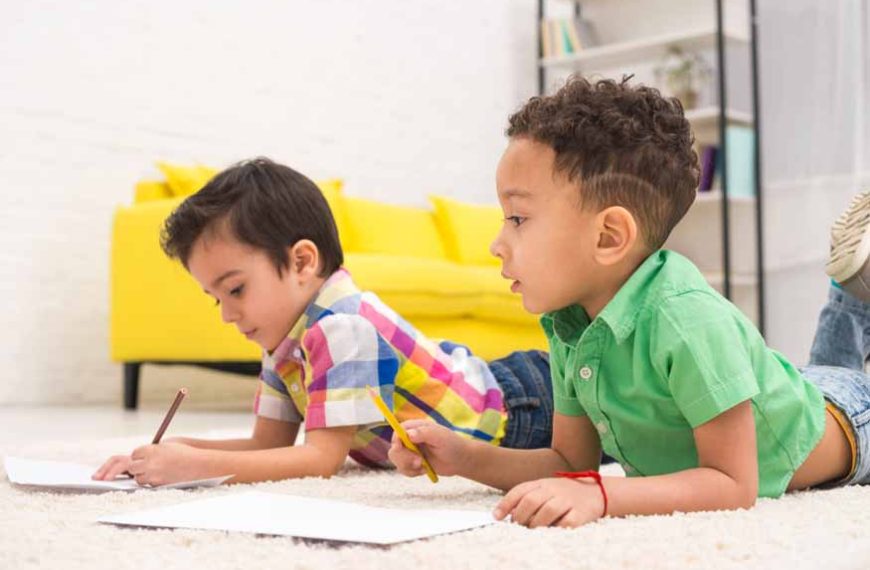In the post-Covid pandemic era, everything around the world is transitioning to the normal from before the pandemic. Businesses and institutions that were functioning virtually are slowly moving back to the in-person structure and in-person learning. In the realm of children heading to childcare in person for in-person learning, benefits to learning in person are immense in nature, with the right amount of guidance to help the child adjust to learning in-person. The transition from the safe and secure confines of home to an entirely new environment for a large part of the day can be both exciting and challenging for the little one. However, with thoughtful planning and support, parents can help ease this transition of heading to childcare in person, ensuring a positive experience for the child. To help your child adjust to learning, we will explore effective strategies and the benefits to learning in person, to make your child adjust to learning in an in-person learning environment and setup.
Understanding the Importance of In-Person Childcare
Children heading to childcare in person leads to many developmental aspects in life. In-person learning in childcare plays a crucial role in the development of children by providing them with opportunities to socialise, learn, and explore in a structured and nurturing environment. While the benefits are immense, the initial adjustment period can be overwhelming for both parents and children. Being aware of the challenges your child may face and preparing for them is essential in making this transition smoother.
Before the Transition
- Visit the Childcare Facility
- Establish a Routine
- Talk About Childcare Positively
Prior to the child’s first day, arrange visits to the childcare facility. Familiarising your child with the new surroundings is very important. When the child meets the caregivers and gets to know about the daily routine, anxiety will be relatively low on the first day as compared to being in a strange environment altogether.
Begin establishing a routine for your child accordingly a week or two before their first day at childcare. This includes having a consistent waking time, meal time, and bedtime. A predictable routine will help comfort the child with a sense of security, making the first day at childcare less abrupt.
Discuss childcare with your child in a positive and enthusiastic manner. Highlight the fun activities, new friends, and exciting learning opportunities that they will experience at childcare. Encourage questions and address any concerns they may have.
During the Transition
- Comfort Items from Home
- Establish a Goodbye Routine
- Open Communication with Caregivers
Allow the child to bring comfort items from home. It can be their favourite little toy or their favourite tiffin case. Having familiar objects from home will provide the child with a sense of security and make the new environment feel comforting like home.
Create a consistent and positive goodbye routine with the child. Keeping the goodbye short, sweet, and reassuring will work the best. This will help the child understand that the goodbye is temporary and that they will be picked up after a certain interval to go home.
Establish open communication with the childcare providers. Feel free to share relevant information about your child’s preferences, routines, specific needs, and quirks. This collaborative effort ensures that everyone is a team and on the same page, promoting a smooth transition.
After the Transition
- Reinforce Positive Experiences
- Stay Connected
- Maintain Consistency
- Address Challenges Promptly
Celebrate your child’s successes at childcare. Even a small success is significant and needs an applause at home. Reinforce positive experiences by acknowledging their achievements, friendships, and new skills that the child acquires. This positive reinforcement helps to boost a child’s confidence and provides them a sense of accomplishment.
Stay involved in your child’s childcare journey by maintaining open communication with your child as well as their caregivers. Regularly check-in on your child’s progress, discuss any concerns, and actively participate in parent-teacher meetings or events organised by the childcare centre.
Continue to maintain a consistent routine at home even on off-days and holidays. Consistency between home and childcare will help the child feel secure and supported in both environments.
Be attentive to any signs of discomfort or challenges that your child may face at the childcare. Be a patient listener. Address issues promptly, either by discussing them with the childcare or seeking guidance from professionals if required. Early intervention provides a positive overall experience.
Benefits to Learning in Person at Childcare
- Social Development
- Structured Learning Environment
- Physical Activity and Outdoor Play
- Professional Supervision and Care
- Routine and Consistency
- Early Learning Opportunities
- Peer Interaction and Team Building
A child is provided the opportunity to engage in social interactions with peers. Social development is a crucial aspect of a child’s overall growth. In in-person childcare, children can learn to navigate social situations, make friends, and develop essential social skills. Face-to-face interactions contribute to a child’s emotional intelligence, empathy, and ability to cooperate with others.
In-person childcare settings often offer a structured learning environment that includes age-appropriate activities and educational programs. Trained childcare professionals facilitate these activities, which ensures that children engage in meaningful and educational experiences that stimulate their cognitive development. The structured nature of in-person childcare programs provides a balance between play and learning, creating a holistic approach to a child’s intellectual growth.
In-person childcare facilities incorporate outdoor playtime and structured physical activities into their daily schedules. Outdoor play and physical activity help in physical development of children, exploration of the natural world, and development of gross motor skills. These aspects also help children expend energy in a positive and constructive manner.
In-person childcare has the availability of trained professionals who understand the unique needs of children at different developmental stages. These caregivers provide supervision and care to children in a manner that may be challenging to replicate in a remote or virtual setting. The presence of qualified professionals ensures that children are in a safe and secure environment, where their physical, emotional, and developmental needs are met.
A consistent routine helps children feel secure and it helps in the development of healthy habits in children. The predictability of a childcare routine can make transitions to other life stages, such as starting school, smoother for children who have already experienced a structured environment.
In-person childcare incorporates early learning opportunities that lay the foundation for a child’s academic success. There are a multitude of activities such as storytelling, art projects, and basic maths, and language skills which are introduced in a supportive and nurturing environment. Exposure to these early learning experiences can contribute to a child’s readiness for formal education, introducing a love for learning from an early age.
Through group activities and peer interaction that comes with it, children learn to share, take turns, and work together towards common goals. These experiences contribute to the development of crucial life skills that will serve them well in various social settings throughout their lives.
Helping your child adjust to in-person childcare involves a combination of preparation, communication, and ongoing support. Remember that every child is unique, and the adjustment process may vary. Be patient, stay engaged, and celebrate the milestones achieved along the way. With your active involvement and a nurturing childcare environment, your child is likely to thrive and enjoy the benefits of this enriching experience.
For more information, visit EuroKids, or visit a centre nearest to you.
















